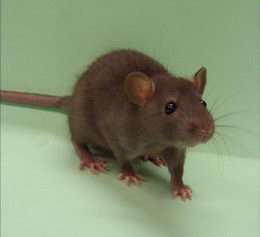September 6, 2012 report
Researchers devise a way to manipulate a rat's dreams

(Medical Xpress)—Cognitive scientists working at MIT have devised a means for not only altering the dreams of rats, but of demonstrating a way of testing what they've achieved, offering evidence that it can be done, and in so doing have offered a glimpse into what may lie ahead for people who wish to manipulate their own dreams. Daniel Bendor and Matthew Wilson, working out of MIT's Picower Institute for Learning and Memory have, as they describe in their paper published in Nature Neuroscience, used audio sounds to influence the dreams of rats they were studying.
Dreams, like gravity and reasons for our existence, are not understood at all. Nobody knows why we have them or what we get from them, though there are countless theories. And until now, most would have agreed that dreams are a phenomenon all their own; we, as the dreamers, are merely passive viewers, watching and responding emotionally to the events as they unfold, but powerless to control the action.
Bendor and Wilson thought maybe it was possible to alter the action by controlling the real world environment that surrounds some test rats as they slept; to find out, they devised a simple experiment. First they taught a rat running through a maze to respond to two different audio tones. The first meant they'd find a treat if they turned right, the second meant they'd find a treat if they turned left. After the rats had it down, the research duo recorded their brain wave patterns as they ran through the maze and responded to the tones. Later, after the rats had bedded down for the night and were dreaming, their brain wave patterns were recorded again, this time to show what they knew the rats would be dreaming about; the maze of course. Comparing the brain waves from the actual maze runs to those that occurred while the rats were sleeping showed this to be true. Then, to alter the rats' dreams, the researchers played the same audio tones that had been used in the maze tests, and found that the brain waves of the rats responded in the same way as they had when the rats were awake and in the maze, proving that the audio tones had influenced their dreams in a directly controlled manner.
Due to their findings, the researchers speculate that maybe someday soon there will be a new kind of science, i.e. dream engineering, where scientists learn all manner of ways to manipulate dreams in people, and then people use those techniques to customize their dreams to conjure up whatever it is they can imagine, and possibly, to eliminate nightmares.
More information: Biasing the content of hippocampal replay during sleep, Nature Neuroscience (2012) doi:10.1038/nn.3203
Abstract
The hippocampus is essential for encoding self-experienced events into memory. During sleep, neural activity in the hippocampus related to a recent experience has been observed to spontaneously reoccur, and this 'replay' has been postulated to be important for memory consolidation. Task-related cues can enhance memory consolidation when presented during a post-training sleep session, and, if memories are consolidated by hippocampal replay, a specific enhancement for this replay should be observed. To test this, we trained rats on an auditory-spatial association task while recording from neuronal ensembles in the hippocampus. We found that, during sleep, a task-related auditory cue biased reactivation events toward replaying the spatial memory associated with that cue. These results indicate that sleep replay can be manipulated by external stimulation and provide further evidence for the role of hippocampal replay in memory consolidation.
© 2012 Medical Xpress



















